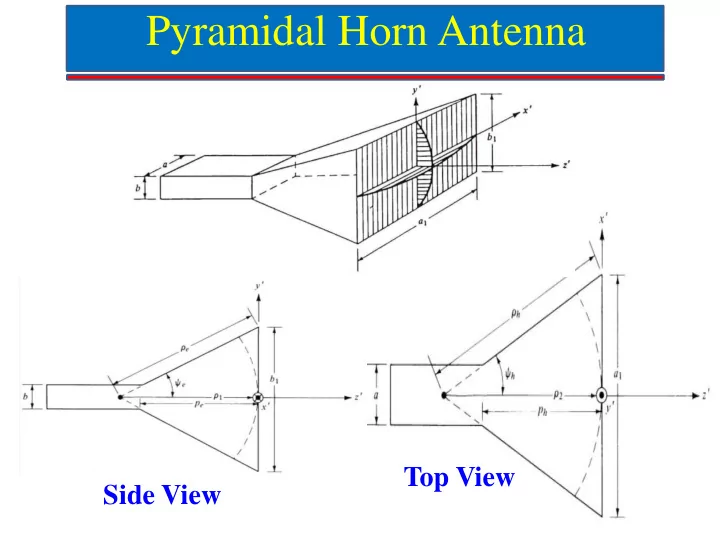

Pyramidal Horn Antenna Top View Side View
Pyramidal Horn Antenna Condition for Physical Realization:
Pyramidal Horn: Design Procedure Alternatively Directivity of Pyramidal Horn Antenna can be obtained using Directivity curves for E-and H-Planes Sectoral Horn antenna
Pyramidal Horn Design Steps
Pyramidal Horn Design: Example
Pyramidal Horn Design: Example (Contd.)
Pyramidal Horn Design: Example (Contd.)
Optimum Dimensions vs. Directivity L λ a Hλ a Eλ Gain (dBi)
Radiation Pattern of Pyramidal Horn Antenna H-Plane Pattern E-Plane Pattern
Coaxial Feed Pyramidal Horn Antenna H-Plane View E-Plane View Reference: Hemant Kumar and Girish Kumar, “ Design and Parametric Analysis of with High Efficiency”, Proceedings of International Pyramidal Horn Antenna Symposium on Microwave and Optical Technology (ISMOT) 2015, pp. 134-137.
Coaxial Feed Pyramidal Horn Antenna Designed at 900 MHz Parameter Value Description (mm) 450 Aperture Width A 320 Aperture Height B 240 Waveguide Width a 120 Waveguide Height b 110 Waveguide Length WG_L 250 Horn Length R E = R H 75 Probe Length l 3.5 Probe Radius r 67.5 Distance of feed from short d_sc
Effect of Probe Feed Length As the probe length increases from 70 to 80 mm, the resonance frequency decreases from 895 to 790 MHz and the input impedance curve rotates clockwise.
Effect of Probe Feed Radius As the probe radius increases from 2 to 5mm, the resonance frequency decreases slightly due to increase in the fringing fields and bandwidth increases.
Effect of Probe Feed Location As the probe feed location is moved towards shorting wall (i.e., decreased from 75 to 60 mm), the input impedance becomes inductive so the curve shifts upward.
Effect of Horn Length on Efficiency For Horn Length R E = R H > 150 mm, efficiency > 72% and for R E = R H > 250 mm, efficiency ≈ 80%
Effect of Horn Aperture on Directivity As aperture area increases, directivity increases. But for larger aperture as frequency increases, phase error increases, which decreases the gain of the horn antenna.
Simulated and Measured S 11 of Coaxial Feed Pyramidal Horn Antenna Bandwidth for S11 < -10dB : CST Simulation : 47% IE3D Simulation : 49.5% Measured Results : 52%
Simulated Radiation Pattern of Coaxial Feed Pyramidal Horn Antenna Simulated E-Plane Simulated H-Plane Radiation Pattern Radiation Pattern
Conical Horn Antenna
Conical Horn: Directivity Curve
Conical Horn Antenna: Directivity δ max = 135 ° Phase Error too high: Not Recommended
Conical Horn Optimum Dimensions vs. Directivity L λ D λ Gain (dBi)
Measured Pattern of Conical Horn E-Plane Pattern H-Plane Pattern 20 Log 0.37 = -8.6 dB. Higher SLL due to large phase error.
MSA Integrated with Conical Horn Suspended CMSA integrated inside a Conical Horn Antenna. Simulation using IE3D software.
Radiation Pattern of Integrated Conical Horn Gain of Suspended CMSA = 9 dB Gain of Integrated Conical Horn Antenna = 12.5 dB
Measured Results of Integrated Conical Horn Measured BW for |S11| < -10 dB is from 2070 to 2210 MHz
Horn Antennas Prof. Girish Kumar Electrical Engineering Department, IIT Bombay gkumar@ee.iitb.ac.in (022) 2576 7436
Dual Mode Pyramidal Horn Antenna d d 1 d 2 TE 10 TE 12 / TM 12 Multimode
Dual Mode Conical Horn Antenna d=2b d=2a d=2a 0 l TE 11 Dual Mode TM 11
Step-Less Dual Mode Conical Horn θ f 2a 2a 0 l
Circular Corrugated Horn Antenna
Corrugated Surface Typical Values of d, No. of Teeth, w and t: Depth of the gap (d) = 0.25 λ to 0.5 λ No. of Teeth (n) = 4 to 10 per λ Width of the gap (w) = 0.05 λ to 0.2 λ Teeth thickness (t) = 0.02 λ to 0.1 λ
Corrugated Conical Horn
Multimode Horn Antenna TE 10 and TE 01 : Excited with Equal Amplitude and Phase in a square waveguide
Circular Waveguide with Flange Circular waveguide with flange and 4 chokes for wide-beam- width high-efficiency feed of low F/D parabolic reflectors.
Broadband Exponentially Tapered Horn C A B Launcher
Broadband Dual Ridged Horn
Compact Aperture Matched Horn Antenna Exponential Ridges are used to increase bandwidth. Aperture matching at the end is done to improve VSWR, reduce scattering and increase the gain.
Recommend
More recommend